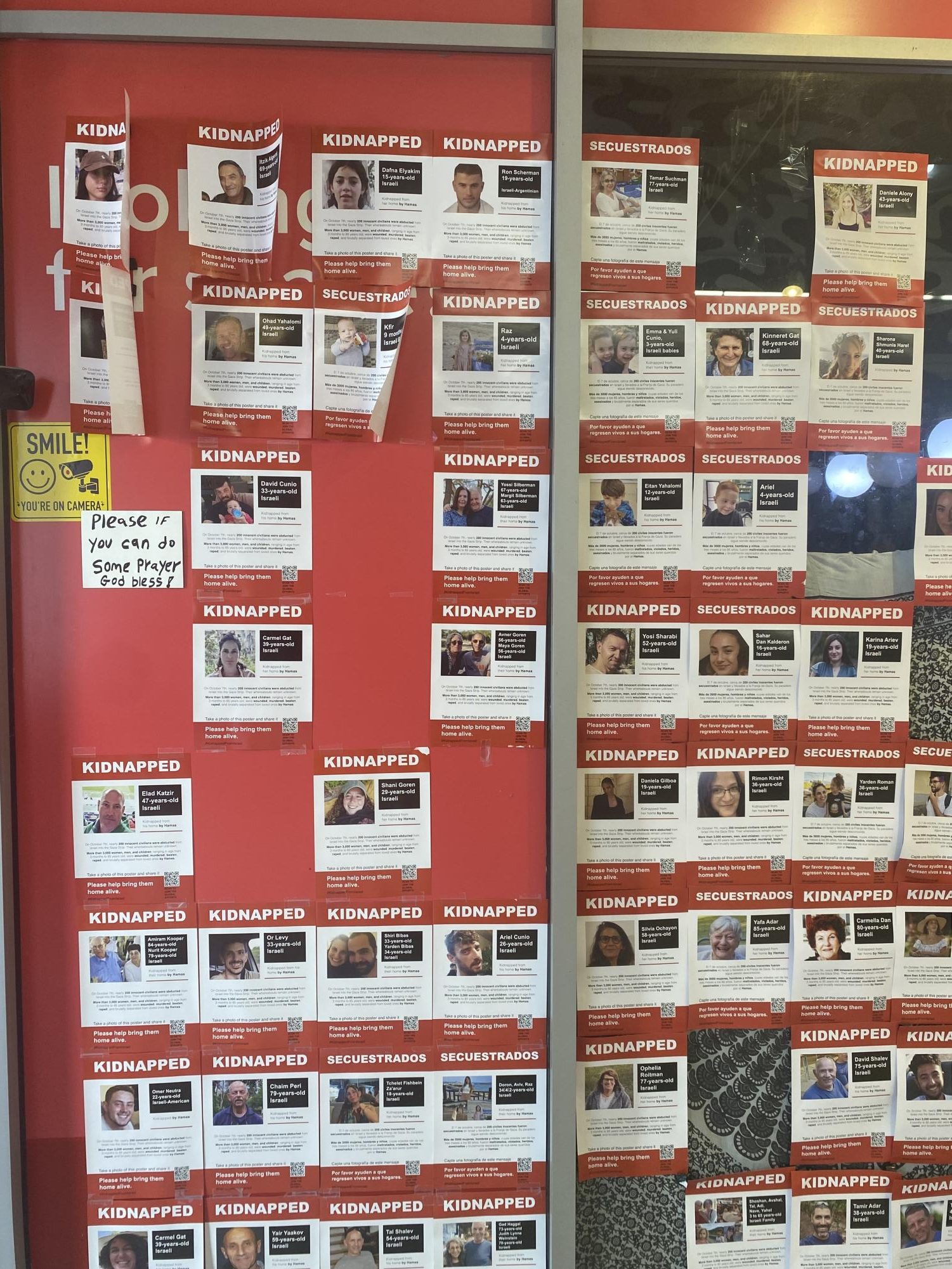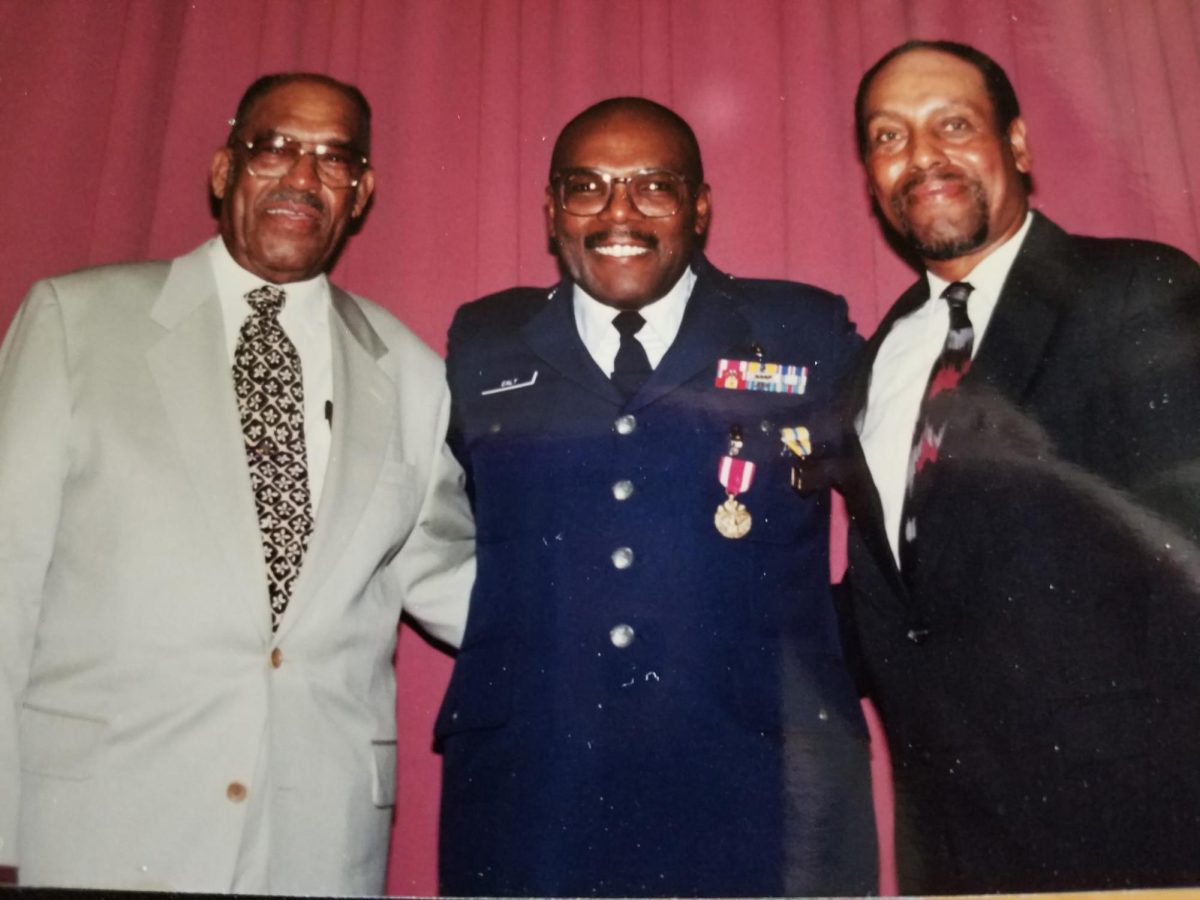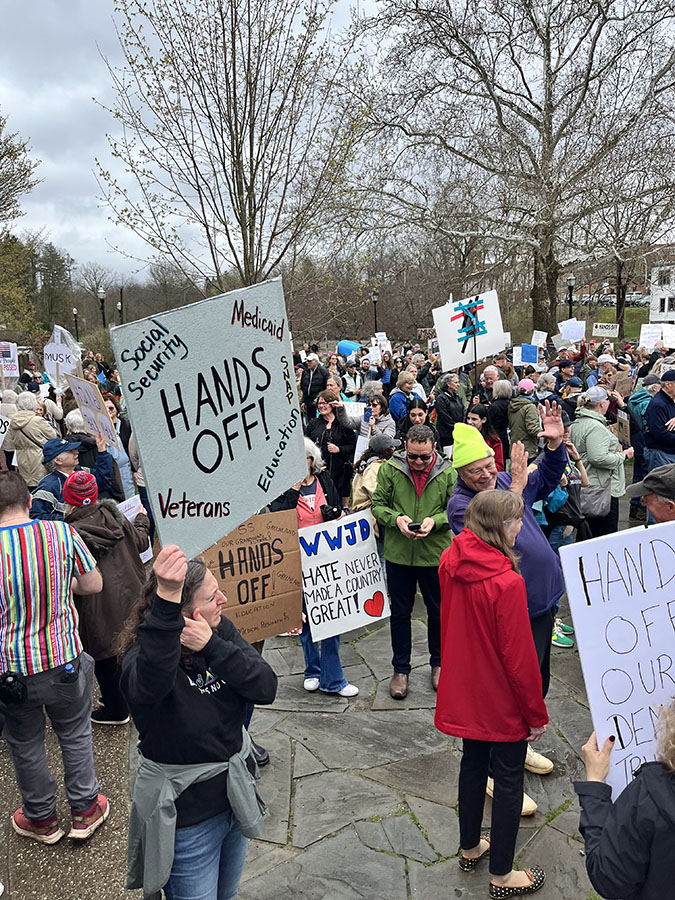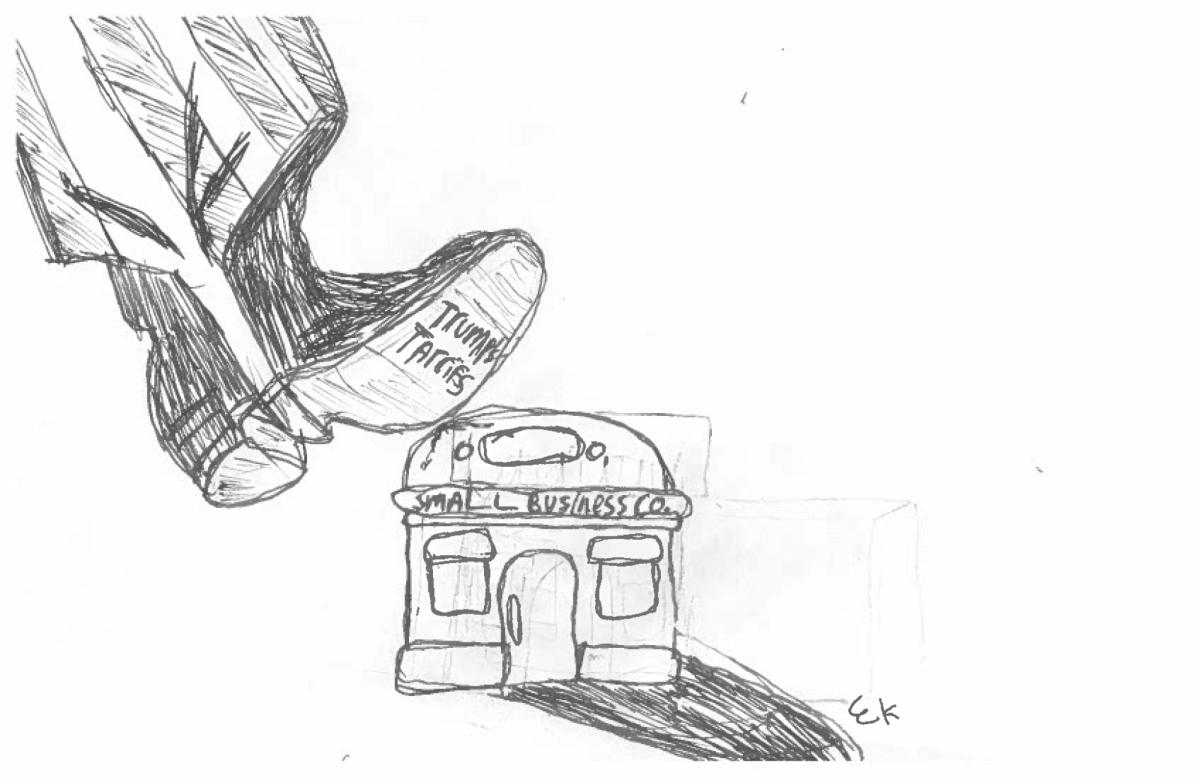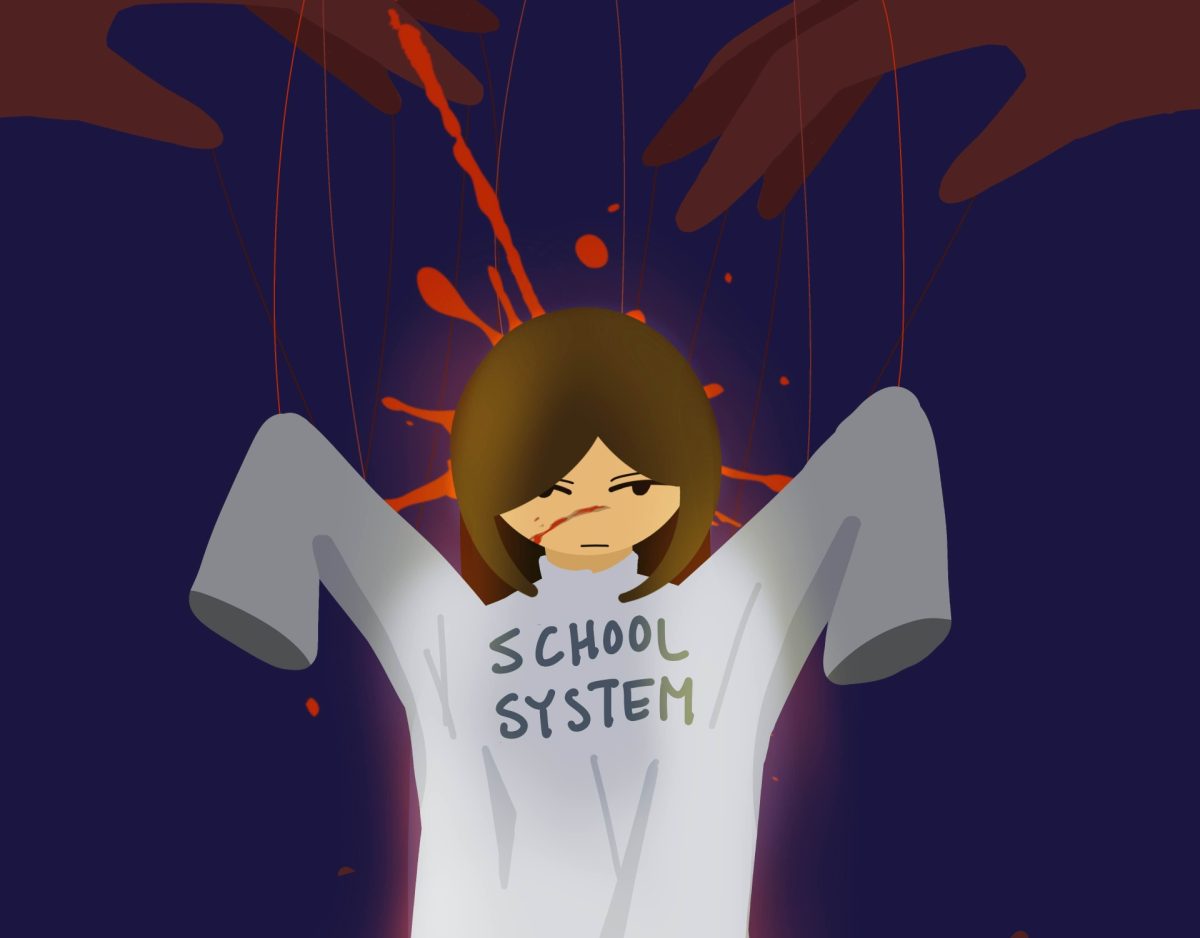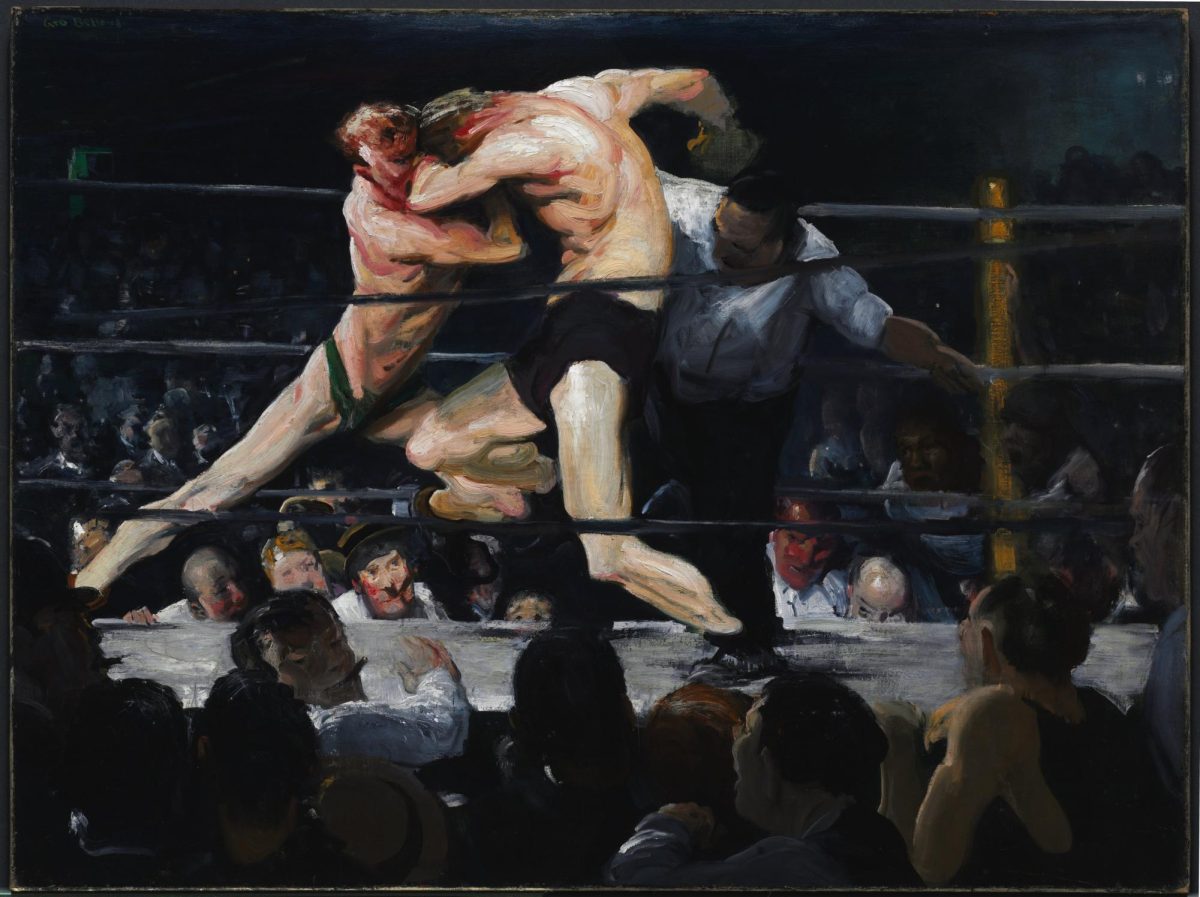During the early morning hours of Oct. 7 I lay in bed, eyes squinting open as my phone buzzed frantically, blowing up with texts and notifications.
As I fumbled to unlock my screen I saw Hebrew letters, missed calls and pictures of fire and rubble; I immediately knew something was wrong.
At 6:30 that morning, Hamas militants invaded Israel by land, air and sea. In an attack with disturbing parallels to 9/11, Hamas had murdered 1,200 innocent people in little more than a day.
They killed young and they killed old. Women, children, Holocaust survivors. My family in Jerusalem was hiding in a bunker, terrified.
240 civilians were kidnapped and taken hostage, herded into tunnels underneath Gaza City, and as of publication most are still in captivity with negotiations at a standstill.
The slaughter was posted online by terrorists using their victims’ phones and then reposted by thousands of people around the world. It was the worst horror perpetuated on the Jewish people since the Holocaust.
“I was utterly shocked and overwhelmed,” said Danielle Mossinson. “I have never experienced anything like it.”
Mossinson is a member of the Shinshinim program in Cleveland, a gap-year program designed for Israeli high school graduates to volunteer before their army service and educate people around the world about Israel.
“Growing up, I always thought, ‘Wow, our army is the strongest,’ so I thought that they would handle it, you know?” she said. “Then we found out about the murders, and how many people died and the terrorists parachuting in and shooting civilians.”
Oct. 7 was the darkest night for the Jewish people since the time of the Holocaust, and now there’s another layer to it– because the whole world can see firsthand the atrocities committed, and people still choose to bury their heads in the sand.
Just a few months after Hamas’s grizzly attack, I find it alarming that so many around the world find a way to excuse it.
Israel’s critics are quick to excuse Hamas’s actions by calling Israel an occupying force.
These critics may not realize that actually, Israel disengaged from the Gaza Strip in 2005, and removed all Jewish settlers from the area, leaving Gaza to Palestinian rule after years of war and bloodshed.
That included electing their own government, and on Jan. 25, 2006, the Islamist party of Hamas won Palestinian parliamentary elections. Palestinians voted for Hamas knowing that it was a terrorist organization responsible (by 2006) for hundreds of Israeli deaths in nearly 60 suicide bombings.
In 2007, Hamas defeated Fatah, a more moderate Palestinian party, in a civil war for
control of Gaza. Since then, Hamas has had plenty of time to develop Gaza economically, but they have failed to do so.
Even before Hamas initiated the current war, in spite of the humanitarian aid from Israel and Arab allies such as Iran and Qatar, the Gaza Strip was poverty-stricken, dangerous and overcrowded, with 80% of the population living in poverty. Hamas spent hundreds of millions of dollars on their military instead of feeding their own people.
“Hamas has failed at their roles as the leaders of their people,” Naftali Bennett, Prime Minister of Israel from 2021-2022 said at a Nov. 15 speech at B’nai Jeshurun in Pepper Pike. “They build bombs instead of feeding the Gazans.”
Israel’s critics argue that Gazans have been deprived of resources they need to survive, but prior to the war, Israel indirectly bolstered life in the Gaza Strip in several different ways, such as granting Israeli work permits to thousands of Gazans, which allowed them them to bring paychecks home to their families, and permitting millions of dollars in Qatari cash to pass through into the Gaza Strip for years. Qatar claimed it was for Gazan citizens’ food, water and electricity, but both Qatar and Israel knew this wasn’t true.
Israeli Prime Minister Benjamin Netanyahu often stated this strategy as a way to “buy peace.” He figured that if Hamas had something to lose, they would be less likely to attack.
However, all this aid to the Palestinian people has failed to bring peace.
According to reporting by the New York Times, Hamas has used the money and supplies needed for their people’s survival, and spent it instead on bombs and guns.
“The money from Qatar had humanitarian goals like paying government salaries in Gaza…but Israeli intelligence officials now believe that the money had a role in the Oct. 7 attacks, if only because the donations allowed Hamas to divert some of its own budget toward military operations,” the Times reported.
“Gaza had all the tools to become a paradise when [Israel] left,” Bennett said. “There was fertile soil, good food, water…great beaches. There was potential for a stable country there. But [they] ruined it when they elected Hamas into power.”
However, leaving Hamas to rule–for good or ill–was the Israeli government’s only choice if they wanted to keep the peace. Israel’s public image would improve ever so slightly among human rights organizations and the U.N., but at the cost of missile attacks every few months.
Nobody was expecting the violence to be so catastrophic.
“I expected more from our army,” Mossinson said. “I think there was just a belief…Israel wanted to believe that Hamas is going to be better to their citizens, to the Palestinian people. Israel wanted to believe in peace. Look what it cost us.”
This attempt to please the world at the cost of national security has been a pattern in Israel’s history.
“The media and the world have never loved us,” Bennett said. “But it’s about time we stop caring about what they think of us. What we need is to be respected, not pitied.”
Israel’s critics argue that the people of Gaza are being oppressed. They are not wrong. Palestinians living in the Gaza Strip are indeed being oppressed, but not by Israel. Hamas has been neglectful of their people; their leadership has been so focused on exterminating the Jews that they have been blind to the crises of their own people.
“Look, nobody is saying that the Gaza Strip is a good place to live. It is hell…but Israel has not been there for the last 20 years, and [Israel] has been trying to help them, you know?” Bennet said. “It is Hamas that uses them as human shields. It is Hamas that builds their bombs and hides their guns inside their people’s schools and hospitals. It is Hamas who fires at their own citizens when they try to escape in the humanitarian transit route Israel has set up.”
This ideology was evident in Hamas’ choice to attack Israel.
Israel’s invasion of Gaza was no surprise, especially not to Hamas. It seems to many Israelis that Hamas knew Israel’s swift and powerful retaliation was coming, but they were willing to sacrifice many times the number of Palestinian lives in order to murder the Jews killed on Oct. 7.
“Hamas would let 100 Palestinians starve to death if it meant they could kill one Jew,” Bennett said.
It is clear that Hamas provoked this war, and in so doing brought destruction on their own people. Even so, Israel must do all it can to reduce civilian casualties.
Although Israel’s retaliation was provoked, Palestinian civilians do not deserve to die.
Palestinians at one time elected Hamas to lead them, but that doesn’t make them collectively responsible for the Oct. 7 slaughter. Hamas’ actions are not an excuse for Islamophobia to run rampant.
The blood of Israeli civilians is on the hands of the terrorists, not on the hands of Palestinian civilians.
However, Israel’s retaliation has been heavily scrutinized by the media due to the mass numbers of Palestinian casualties. News outlets have shifted from seekers of the truth to speakers of their truth.
Israel’s critics call for the Netanyahu government to negotiate a ceasefire, without taking into account that thousands of Israelis have been traumatized by the murder and kidnapping of family members.
Many well-meaning Americans post on social media about the war, and many have the right intention: peace. They point to the high number of Palestinians killed in the conflict as evidence of Israel’s “genocide.”
However, they don’t account for their information possibly being wrong, or even biased. For instance, Israel’s critics may not realize that the Hamas-run Health Ministry in Gaza does not differentiate between civilians and combatants, which is awfully convenient to skew statistics in their favor.
It is true that a disproportionate number of Palestinian civilians are being killed. Yet, sometimes escalation is a necessity in order to bring the war to a rapid conclusion and to reduce ongoing civilian casualties. Israel feels that it can’t leave Hamas with any fuel left in the tank, for they might use it to burn Israel to the ground.
Not to mention the fact that Israel isn’t fighting a military that abides by international law, and Hamas’s use of human shields leaves the Israeli military no other choice if they want to protect their own people.
All this confusion and complexity is worsened because people often neglect looking deeper into the details, and this has painted an increasingly negative picture of Israel: a picture of a country filled with hate while their opponents are characterized as freedom fighters.
This couldn’t be further from the truth. Hamas is a terrorist organization that does not have to follow any law or the terms of any international treaty.
“If [Israel] was to accept the ceasefire, [Hamas] would just be back in a few years and kill more of our people,” Bennett said. “We must do something, and we must eliminate the threat to our people.”
A ceasefire with an enemy like Hamas would be dangerous to Israel because Hamas would strike again.
In the 1930s, the British government made a catastrophic decision to appease the Nazis in an attempt to save lives and avoid war, but this choice only fueled Nazi aggression and led to millions more dying. Israel can not afford to make a similar mistake.
Israel’s critics demonize Israel, claiming that Israel is committing genocide, but Israel’s 2005 disengagement from Gaza and decades of restraint demonstrate that ethnic cleansing is not Israel’s goal. It never has been, and it never will be.
Israel’s intention is peace, and that’s exactly why they must make the tough decisions and extinguish Hamas murderers from the Middle East.
The condemnation and antagonization of Israel is not only rampant on social media, though. Antisemitism and anti-Zionism have spread like wildfire across college campuses in the United States.
Countless marches and protests have erupted at these universities, often calling for Israel to “end the genocide” and to stop their retaliation against Hamas.
U.S. citizens, including students, have the right to protest. However, when thousands of people rally in support of a terrorist group whose main goal is to murder Jews, there needs to be repercussions, so that the world knows that antisemitism is no longer tolerated.
There are also thousands more peaceful protestors who are trying to spread awareness for the Palestinian civilians killed, but again, their blame and their anger is directed at the wrong group.
Instead of calling for Israel’s ceasefire, they should be marching against Hamas– the terrorist organization that provoked this war. There is no such thing as a free Palestine while Hamas is still in charge.
When people direct their criticism at Israel instead of Hamas, it brings even more danger. Jews on college campuses continue to be the target of hate crimes, and antisemitic incidents have increased 337% in the last two months according to the American Defamation League.
The dismissal of antisemitism on American college campuses is one of the most alarming things to come to light from this conflict.
After the leaders of Harvard, M.I.T. and University of Pennsylvania evaded questions about whether or not “calling for the genocide of the Jews” goes against their code of conduct, it became grossly obvious that antisemitism is not being taken seriously.
There’s no denying that Israel’s retaliation is a harsh one. However, it is absolutely vital for maintaining democracy in the Middle East, as well as ensuring the existence of the Jewish people. For thousands of years, Jews have been killed, oppressed and dehumanized in every part of the world.
After every atrocity the Jewish people face, they have never had the power to fight back. Only to run away to the next town or country, hoping to escape persecution.
Israel gives the Jewish people a chance to stand up for themselves. A chance to exist. It is their land, according to international law, and Israel has the right, but also the responsibility to defend the Jewish people.
That’s why it is so important that the world opens its eyes to the harsh reality we’re faced with. It’s imperative that world leaders think critically, and see that the true enemy of the Palestinians is not Israel.


